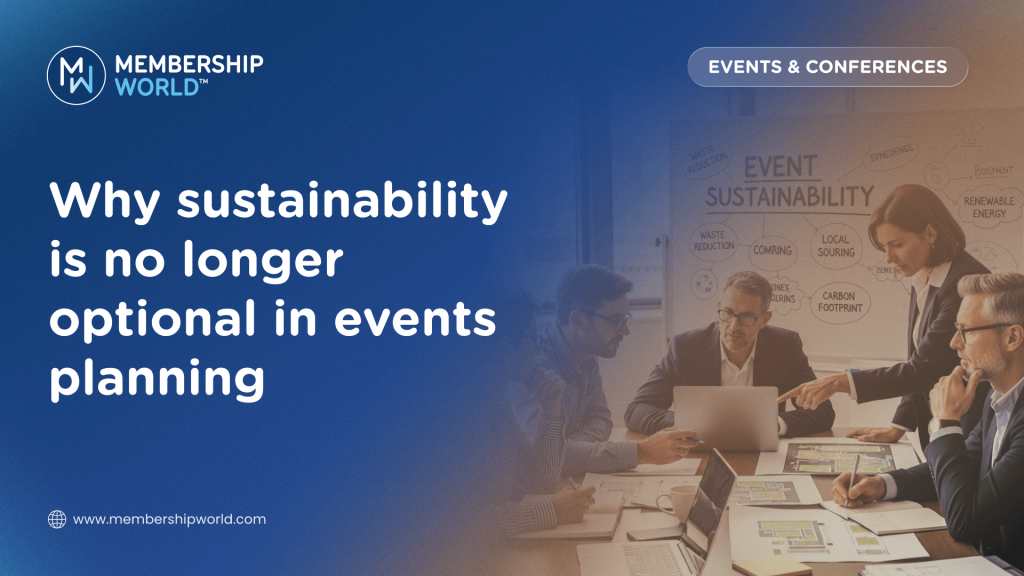
Events are powerful. They bring people together, spark ideas, and strengthen communities. But they also have a footprint — in travel, materials, catering, and energy use. For years, sustainability in events was seen as a “nice-to-have,” something to consider if budgets and time allowed.
In 2025, that mindset no longer works. Sustainability has moved from the margins to the mainstream. Members expect it. Sponsors demand it. Governments regulate it. And event organisers who ignore it risk more than reputational damage — they risk becoming irrelevant.
This blog explores why sustainability is now a non-negotiable part of event planning, what it means in practice, and how associations can embrace it without compromising on quality.
TLDR
- Sustainability is now a core expectation from members, sponsors, and regulators.
- It covers more than carbon footprint — it includes materials, inclusion, and community impact.
- Associations that take sustainability seriously strengthen trust, credibility, and long-term value.
- Small, practical steps can make a big difference without blowing the budget.
Why sustainability matters more than ever
The push for sustainable events has been building for years, but several trends in 2025 have made it impossible to ignore:
- Member expectations: Many members, particularly younger professionals, actively choose organisations and events that align with their values. They want to know their participation doesn’t come at a high environmental cost.
- Sponsor requirements: Corporate partners are under pressure to meet their own ESG goals. They increasingly ask for evidence of sustainable practices before committing sponsorship money.
- Government regulation: From carbon reporting requirements to restrictions on single-use plastics, new rules are shaping how events can be delivered.
- Reputation and trust: An event that ignores sustainability risks looking out of touch and can damage the credibility of the association.
Beyond recycling: a broader view of sustainable events
When people hear “sustainability,” they often think about recycling bins and paperless agendas. Those matter, but true sustainability in events goes further. It touches every stage of planning and delivery:
- Travel and transport: Encouraging public transport, offering hybrid options, or hosting regional gatherings to reduce long-haul flights.
- Venues: Choosing spaces that prioritise energy efficiency, waste reduction, and accessibility.
- Materials: Reducing giveaways, moving from printed to digital, and sourcing from sustainable suppliers.
- Catering: Offering plant-based or locally sourced options, reducing food waste, and avoiding single-use plastics.
- Inclusion: Recognising that sustainability also means social sustainability — ensuring events are accessible, affordable, and inclusive.
- Community impact: Partnering with local businesses, leaving a positive footprint in host cities, and supporting local causes.
What members really notice
Not every attendee will ask about carbon offsetting policies or supply chains. But members do notice practical things, such as:
- Whether water is served in reusable bottles or endless plastic cups.
- Whether they are handed a tote bag of flyers they will never use.
- Whether the event makes it easy to recycle or reduce waste.
Often, small visible changes send a strong signal that the association takes sustainability seriously.
The cost question
One of the biggest hesitations around sustainable events is cost. Some practices — like choosing greener venues or sourcing local catering — can initially seem more expensive. But associations are finding that:
- Many sustainable choices (like going paperless or reducing giveaways) actually save money.
- Sponsors are more likely to fund events with clear sustainability policies.
- Members are often willing to pay slightly higher fees for events that align with their values.
Sustainability doesn’t have to mean perfection or breaking the budget. It’s about continuous improvement and transparency.
Steps associations can take now
For associations that want to embrace sustainability in events, here are some practical starting points:
- Audit your current practices: Where does the most waste occur — travel, catering, printing, giveaways?
- Set clear goals: For example, reducing single-use plastics by 80% or sourcing 50% of food locally.
- Communicate openly: Tell attendees what you are doing and why. Members appreciate transparency, even if you are not yet perfect.
- Involve members: Ask for their ideas and preferences. Many will welcome the chance to contribute.
- Measure and report: Share the outcomes after the event — how much waste was reduced, how many emissions were saved, what positive community impact was achieved.
The bigger picture
Sustainability isn’t just about one event. It’s about building an organisational culture that aligns with the future members and sponsors expect. Associations that take this seriously send a powerful message: we care about the impact we make, not just the events we host.
By embedding sustainability into event planning, associations strengthen trust, increase credibility, and create experiences that members feel proud to support.
Final thought
Sustainability is no longer optional in events. It is a defining feature of what makes an event relevant and responsible in 2025. Associations don’t need to be perfect, but they do need to start — and to show members, sponsors, and communities that they are committed to making progress.
Because at the end of the day, events are about bringing people together to create a better future. And that future depends on making choices today that are sustainable for tomorrow.
💬 How is your organisation weaving sustainability into its events?



